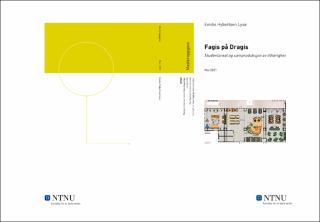| dc.contributor.advisor | Kvaal, Stig | |
| dc.contributor.advisor | Berker, Thomas | |
| dc.contributor.author | Lysø, Emilie Hybersten | |
| dc.date.accessioned | 2021-09-24T18:30:55Z | |
| dc.date.available | 2021-09-24T18:30:55Z | |
| dc.date.issued | 2021 | |
| dc.identifier | no.ntnu:inspera:78640361:13636841 | |
| dc.identifier.uri | https://hdl.handle.net/11250/2781824 | |
| dc.description.abstract | Denne oppgaven utforsker hvordan studenter har tatt i bruk det nye studentarealet Fagland ved NTNU campus Dragvoll gjennom problemstillingen hvordan tar studenter i bruk det nye studentarealet Fagland, og hva betyr arealet for deres tilhørighet? Studiens hensikt er å bidra innen forskningsfeltet læringsareal. Datagrunnlaget baseres på kvalitative intervjuer med tolv informanter, observasjoner, brukerundersøkelse og bilder, og er innhentet i en periode på litt over seks måneder (oktober 2020 til mai 2021). Analysen av det empiriske materialet har en narrativ form og tar utgangspunkt i STS-begrepene skript og domestisering, som viser til tiltenkt bruk og faktisk bruk av arealet.
Resultater fra det empiriske materialet viser at det er en sammenheng mellom tiltenkt bruk og faktisk bruk i flere av arealets soner, men at noen av sonene eller artefaktene ikke nødvendigvis blir brukt som de var tiltenkt. Temaer som psykisk helse og ensomhet blant studenter ble særlig aktualisert under korona-pandemien, og vises også i det visuelle i Fagland gjennom bruk av whiteboard-tavler som en plattform for kommunikasjon og utløp for vanskelige følelser. Faglands rolle i studenters sosiale liv er også blitt poengtert gjennom data fra observasjoner og intervjuer, og studien viser at Fagland har blitt opplevd som et viktig samlingssted for studenter.
Gjennom en narrativ analyse av bruk og “temming” av Fagland på et praktisk, symbolsk og kognitivt nivå er det blitt identifisert tre brukergrupper; innbyggeren, turisten og gjestearbeideren. Dette rammeverket for identifisering av bruk og brukere kan ha en overføringsverdi til andre undersøkelser av student- og læringsareal. Studiens praktiske implikasjon er etablering av studentsentrerte areal med utgangspunkt i faglige og sosiale aspekter på studenters premisser. Dette er viktig for å øke studenters opplevelse av tilhørighet, og for å skape campus som en attraktiv læringsarena også utenfor undervisningstid. | |
| dc.description.abstract | This thesis explores how students have put the new student space Fagland at NTNU campus’ Dragvoll to use, through the research question how does students use the new student space Fagland, and what does the area mean for their affiliation? The purpose of this study is to contribute to the research field about learning spaces. The data in this study has been gathered over a period of just over six months (October 2020 to May 2021), and are based on qualitative interviews with twelve informants, observations, a user survey, and photos. The analysis of the empirical material has a narrative form and is based on the STS concepts script and domestication, which refers to the intended use and the actual use of the student space.
Results from the empirical material shows that there is a connection between the intended use and actual use in several of Fagland’s zones, but some zones or artifacts are not necessarily being used as they were intended. Themes such as mental health and loneliness among students were particularly relevant during the corona pandemic and are also shown visually in Fagland through the use of whiteboards as a platform for communication and an outlet for difficult emotions. Fagland’s role in students’ social lives has also been emphasized through data from observations and interviews, and the study shows that Fagland has been perceived by students as an important space to meet their peers.
Through a narrative analysis of the use and “taming” of Fagland on a practical, symbolic, and cognitive level, three user groups have been identified: the citizen, the tourist, and the guest worker. This framework for identifying use and users may have a transfer value to other studies of student spaces and learning spaces. The practical implication of the study is the establishment of student-centered spaces based on academic and social aspects on students’ premises. This is important to increase students’ experience of belonging, and to create campus as an attractive learning space also outside of curriculum activities. | |
| dc.language | nob | |
| dc.publisher | NTNU | |
| dc.title | Fagis på Dragis - Studentareal og samproduksjon av tilhørighet | |
| dc.type | Master thesis | |
